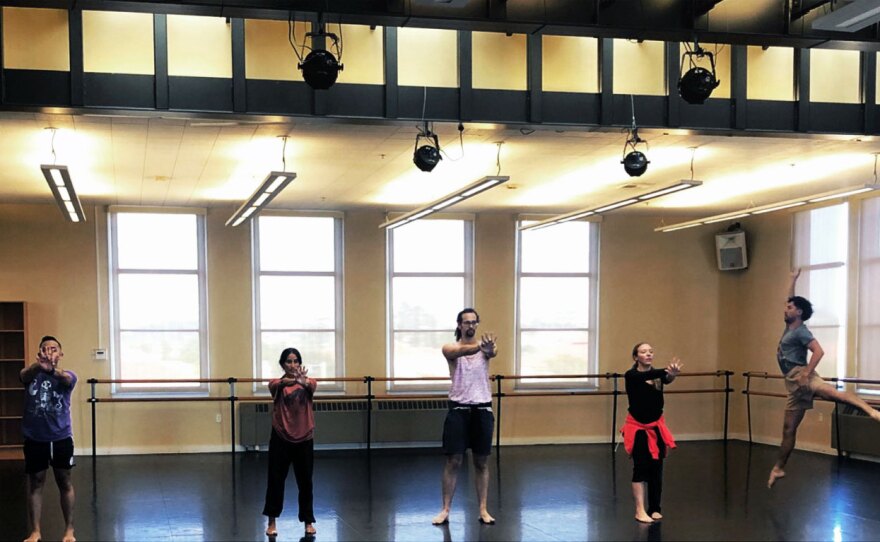Let's make one thing clear first: "I don't plan to disappear off the choreographic earth," said John Malashock, founder and artistic director of Malashock Dance.
The 35-year-old company is beginning what they're calling the "Malashock evolution," a loose and unscheduled plan for John Malashock to step back from artistic direction and the majority of the choreography for the company.
Through the last year, the company has been considering and planning the foundation for a transition, which they acknowledge will take time and money.
Malashock's hope is that a strong, younger artist will bring their own vision to the company, while also honoring the legacy and "cultural tradition" of their 35-year history.
Projects like this month's "Everyday Dances" are signs of that evolution. In four performances this weekend at Mingei International Museum and an additional four performances in two weeks at their own studio, Oct. 21-23, John Malashock is one of nine choreographers offering their voices.
"This show is a big step toward getting away from what people perceive as Malashock Dance being sort of a single choreographer company," Malashock said. "My hope is as things transition that I will stay connected with the organization, be able to create work, but not carry all that the artistic director carries."
While Malashock did not provide any thematic parameters to the choreographers, "Everyday Dances" as a whole was informed by the Japanese folk art concept of "mingei," or "art for the people."
Lavina Rich is a choreographer and one of three dance artists currently granted free studio space in Liberty Station as part of the 2022 Arts District Emerging Artist program. While in residence, she's created works for the La Jolla Playhouse Without Walls (WOW) Festival and Disco Riot's Queer Movement Festival.

Her piece for "Everyday Dances" is called "Cul de Sac Prayers." The seeds for the piece were planted early in the COVID-19 lockdown, when she heard about the Peptoc ("pep talk") hotline where kindergarteners provide useful advice and affirmations.
"I called in and it was just what I needed at that time," Rich said. "Some of them are so simple as just 'Try it again.' It's just this little child telling an adult that you can do it and make it, and it made me think: do we, as adults, complicate things so much? Is it that simple?"
Rich also said that piece speaks to the nuances in the ways individuals and communities heal and help each other.
"Is the community always helpful? We're all trying to help each other, but are we actually helping each other? Are we actually listening? Are we actually putting in the work to actually help?" Rich said.
These questions also inform Rich's approach to the art form.
"I think a lot of people, whether they're dance consumers or not, know what dance looks like. So that's been done. My interest is in seeing humanity and seeing how people move — as a person, as well as how they interact with others," she said.

"Cul de Sac Prayers" is a piece for five dancers, set to music by Kendrick Lamar.
"United in Grief" is the opening track from Lamar's latest album — a propulsive, chaotic song that ramps up in tone and speed as Lamar outlines what he's been through, punctuated by melodic, suspended refrains of "I grieve different."
The relatability of the song stuck with Rich, as well as a person's uncanny ability to get caught up in their own issues.
"There's a line in there where he says, 'The world that I live in is a cul de sac,' and it made me think about that word," she said. "When I was a kid, where I lived there was a cul de sac right by our house, and we would just ride our bikes around and around and around and around forever and ever… until one of us just took off, and we're like 'Oh, there is an exit out of this.'"
Each piece is between four and seven minutes long (Malashock's only parameter), creating a patchwork of relatively short pieces for an hour-long concert — it's all part of the accessibility and approachability they want for their audiences.
Malashock said that the majority of the works in the production are small — for a solo, duet or trio, but Rich's piece and another by Araceli Carrera are for a slightly bigger ensemble. Carrera's piece is soulful, Malashock said, with some Latin music influence.
Sebastian Eusebio Arredondo has a solo piece that explores the coexistence of masculinity and femininity. John Malashock has two new pieces in the program, "Spitting Nickels" and "Solitaire."
"One of my pieces might be the most outlier in the music," Malashock laughed. "It's using an old, amazing guitar solo by Frank Zappa."
Other choreographers are Rachel Catalano, Natalia Hill, Caryn Ipapo-Glass, Joseph Lister and Zaquia Mahler Salinas.
"This show is a little bit of a test run, I feel, with contributing two new works to the show. It's very different than what I'm used to," Malashock said. "And it doesn't feel like I'm sort of just putting myself on the back burner or anything. It's shifting my own role as well as the organization's."
Everyday Dances II
- Add to Google Calendar
- Add to Outlook Calendar
Download ICS file






